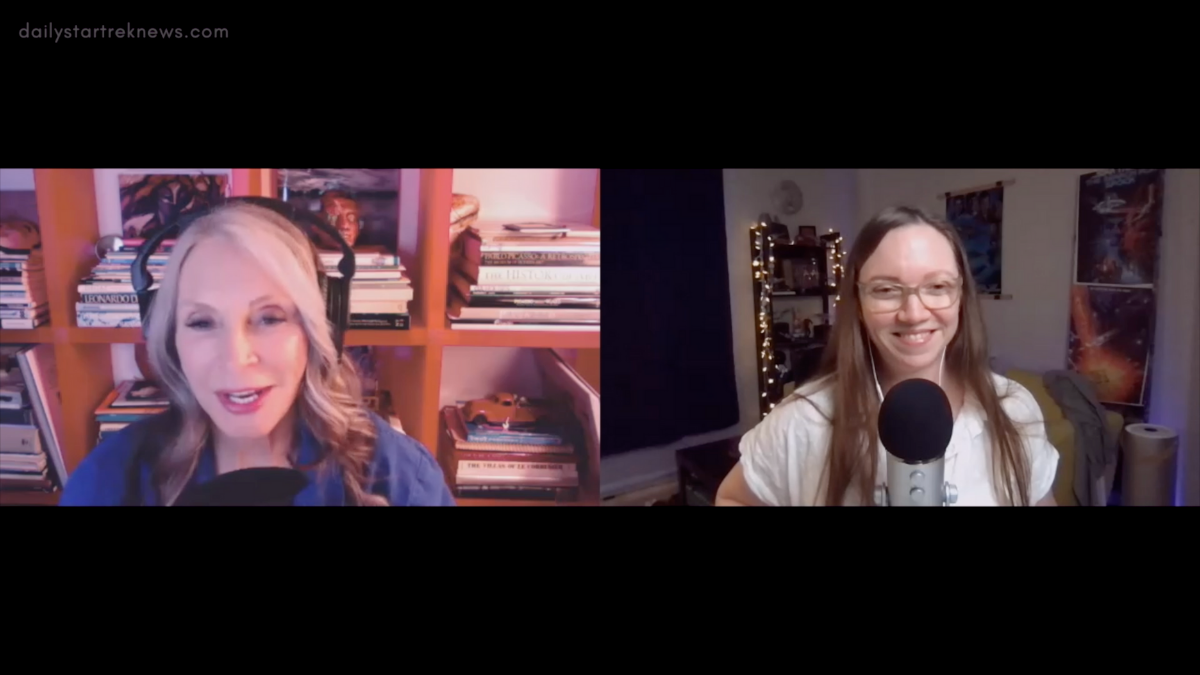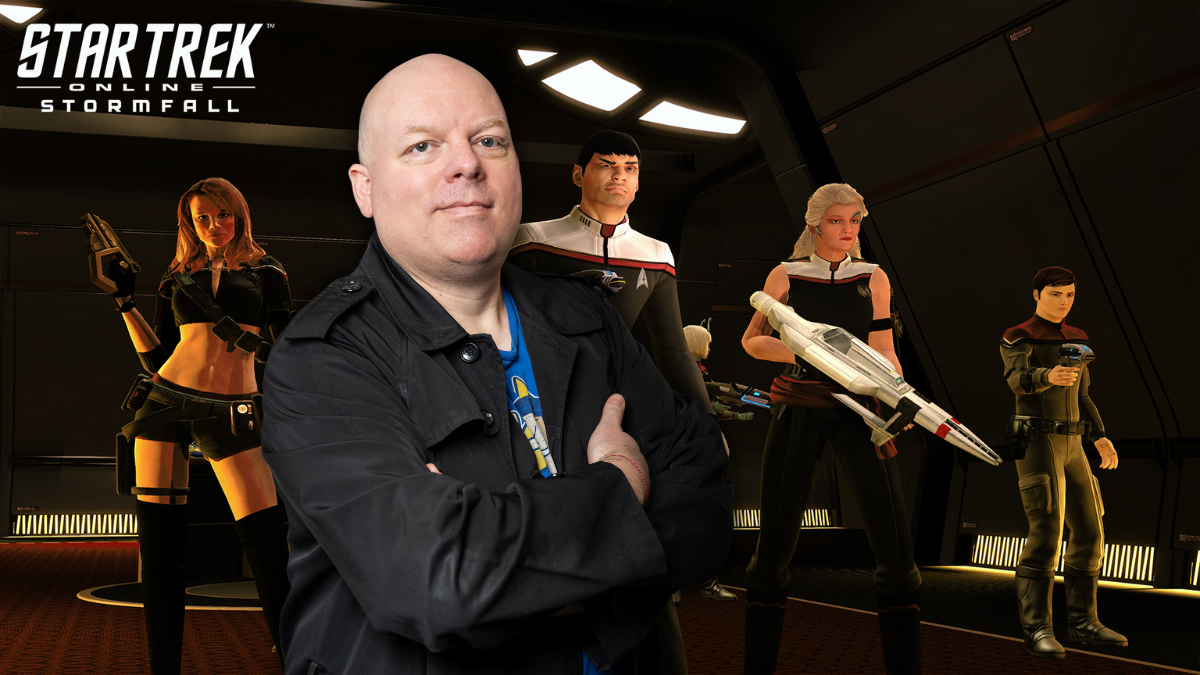INTERVIEW: The Center Seat: 55 Years of Star Trek director Brian Volk-Weiss

Alison Pitt of Daily Star Trek News interviews Brian Volk-Weiss, director of The Center Seat: 55 Years of Star Trek
NOVEMBER 2, 2021 - Brian Volk-Weiss is the founder and CEO of The Nacelle Company, and director of the upcoming documentary series The Center Seat: 55 Years of Star Trek, on The History Channel. We’re talking about that show and about his history as a documentarian and mega-Star Trek fan.
You can watch our whole conversation now on YouTube, or read a transcript of our conversation below. And of course, be sure to catch The Center Seat: 55 Years of Star Trek when it comes out later this week on The History Channel.
Alison Pitt (AP): Welcome Brian! Your show, The Center Seat: 55 Years of Star Trek, is premiering this week on The History Channel. Can you tell us about the show and why now is the right time to make a Star Trek docuseries?
Brian Volk-Weiss (BVW): I’lI go in reverse order! Now is the right time because it seems our society loves every five years to celebrate things. So with it being the 55th anniversary [of the show], that seemed like a good time to celebrate something about Star Trek.
We had done the 50th anniversary documentary, but that was only one episode. We had about an hour and a half to cover 50 years. Then we had made another show on Netflix called The Toys That Made Us, and that allowed us a bunch of opportunities to do shows in that style. So it just got to the point where it was like, “Oh, there's an anniversary coming up!” I'm also a huge Ken Burns fan. And I was always like, “What would a Ken Burns deep dive into Star Trek be like?”
So that was the inspiration. All those things came together at the same time. And we make TV shows, so we were like, “Let's make a TV show.”
AP: Each of the episodes of the series is like a chapter in the story, right? What are some of the chapters that we'll get to see as we go through the series?
BVW: We have an episode that's only about The Animated Series. We have an episode that's only about Phase Two, which would become Star Trek I: The Motion Picture. Then we have an episode basically about Star Trek II and III, IV, V, and VI.
We have a whole episode about Next Generation, Voyager, Deep Space Nine. And then we have a really cool episode that I don't think has been done before! I am a big fan of starship design. So we have a whole episode only about starships, we call it “Starships A through Z”, and it's literally the deepest dive - I think ever - into starship design (primarily Federation).
AP: In addition to The Center Seat being a documentary about Star Trek, you actually have a lot of stars and producers, and all sorts of personalities in there. The show is narrated by Gates McFadden, which is wonderful. And you've got interviews and footage from some stars and producers who are no longer with us. Why was it important to include those people's voices in the show as well?
BVW: What we tried to do was create the deepest dive ever into Star Trek and really explore what it was and what it's become. So you need people from who were there at the beginning and the people who were there at the end. Basically what we tried to do was show Gene Roddenberry and Lucille Ball turning the lights on in the 60s, and it literally ends with Rick Berman turning the lights off at the end of Enterprise. The best way to do that is to get the voices of the people who were there.
AP: Does it include any looks at the current series or what we're doing going forward with Star Trek?
BVW: At the moment, no. What you will see in November stops with Enterprise, but the series is continuing, so we will get to the Next Generation movies, the JJ Abrams movies, for sure. And who knows maybe a little more after that!
AP: Goodness knows there's enough material to cover!
BVW: There really is. And one of the things that I love to do is to dive into topics that haven't really had a magnifying glass put on them. I really like the Next Generation movies quite a bit, but nobody focuses on them!
And one of the cool things we did was spend a lot of time on Star Trek V and VI. We got to put time into those movies that don't get the attention that some of the other films do.
AP: Let’s pivot and talk about your personal history and how you came to this docuseries. I was reading about you and I understand that you started filmmaking when you were pretty young. In high school?
BVW: I'm sorry to interrupt, but I would not call it filmmaking!
AP: Well, you know, we all start somewhere, right?
BVW: I literally made a movie once called Justice is a Foot that was literally about a giant foot smashing cities I had built out of styrofoam. So I cannot claim filmmaking was going on in high school.
AP: The problem now is that you've admitted that in public and somewhere, somebody is going to get ahold of that footage and put it out on YouTube. Now it's inevitable.
BVW: I feel very bad for the whole world.
AP: So talk to me about your journey from a kid messing around with a camera, to now. You're making series for Netflix and you've got The Center Seat. You’re producing comedy specials as well. And your company's called The Nacelle Company. What's that about?!
BVW: It's called The Nacelle Company for two reasons. If I'm being honest, the first is: you would not believe what's already been taken! I was even considering Promontory Point Entertainment, but that was taken. So Nacelle was not my first choice. But it's been a while since you could copyright the word Paramount or Universal!
However, I'm a huge Trekkie. I owe Star Trek quite a bit, I think, for my career and my life. So what I loved about the name, Nacelle, is that to Trekkies, you'll recognize it. I liked the idea that to a Trekkie or a geek or a nerd or whatever, Nacelle has value.
But if you're not a geek or a Trekkie and you hear Nacelle, you'll think, “What a nice French word! I wonder what that means.” So it kind of works both ways.
As far as my journey, I will give you the Cliff Notes. Basically, I came out to LA when I was 22, I became a manager. I represented comedians. I started making comedy specials. I stopped being a manager. We started distributing those comedy specials, and every now and then we would make a TV show. I finally sold a show that became The Toys That Made Us and that show changed my life and changed the company. It changed everything. And now we make standup specials, podcasts, books, you name it. We're making toys now. So yeah, fun stuff.
AP: The recent series are in a documentary style. So is the documentary style specifically something that speaks to you personally? Or is it the format that just has worked the best?
BVW: Since I was a little kid, I have believed that books and documentaries are like an instruction manual to life. We only get one life to live, but books and documentaries allow you so much data about how the world works. You could be reading about a battle, or politics in the 1500s. So many things have changed in over 500 years, but our species hasn't. So what the books and the documentaries allow you to do is see how other people dealt with good news, bad news, challenges, and then it can help you make better decisions during your life because you learn from all of their experience. So yes, I'm very passionate about documentaries.
AP: And then of course now you’ve expanded into podcasting, including Gates McFadden's new podcast, Gates McFadden InvestiGates. I spoke to her a couple months ago. So what about the podcast format kind of feeds into that? Are you approaching them like audio documentaries, or is there something else that appeals about the podcast space too?
BVW: The thing that appeals about the podcast space is that it's storytelling. We love storytelling, and it's another way to tell a story. That's what our company does. All the podcasts are different, but the common link is, at least for the first few years, we're really going to focus on nostalgia and comedy. So if you're interested in pop culture, if you're interested in geekdom or whatever you want to call it, we're trying to be your home.
AP: Earlier you were saying that Star Trek obviously has influenced your life. Something that we do from time to time is ask people to tell us their Star Trek story. What brought them to Star Trek, and what keeps them in the fandom. And I'm curious, what's your Star Trek story?
BVW: It really comes down to the whole idea that Kirk says very clearly in Wrath of Khan: “I don't believe in the no-win scenario.” I was at an age when I saw the movie, that it really changed my life. It's literally in my will, that it will be written on my tombstone. Anybody who perceives my career as successful, it is entirely dependent on that theory of, “I don't believe in the no-win scenario.”
On top of that, I loved the world in which Kirk operated. I love the idea that we were exploring. That we would get through all of our differences and, you know, unite. It was a very, very optimistic view of the future. But at the same time, it was exciting because you have these human beings in a metal can, so far from safety, so far from rescue, and they're doing really dangerous things separated from death by a foot of trans-luminum or whatever the hell it's called.
So that's what I always loved about the show. It was always exciting, but it was also a good code to live by. Many of the rules from Star Trek, not believing in the no-win scenario, the idea of equity, you know, everybody's equal and everybody's the same...it really was ahead of its time. And sadly it still is a bit.
AP: What's kept you still into the fandom? As opposed to, you know, “Oh, that was a great show back in the 90s!”?
BVW: It just connected to me in a way that nothing else has, including Star Wars. And I love Star Wars. I’ve got a collection as big, if not bigger, of Star Wars toys than Star Trek toys. But to me, Star Wars was always a movie, Star Trek was more of a philosophy, of a way to live my life. I didn't grow up religious. I didn't go into the military. Star Trek was, in its own way, a code to follow.
And then the other thing is they keep making great Star Trek! I'm as passionate now about Lower Decks as I was about The Next Generation! I can't wait for Eaglemoss to put out the models. I can't wait for NECA or whoever to put out the figures. When it works, it works. They definitely miss the target every now and then, but when it works, there really is nothing better.
AP: And it just really hasn't stopped in 55 years.
BVW: Yeah, literally.
AP: So for you personally, what are you most excited for people to see in The Center Seat?
BVW: I tried to be like a Trekkie making a documentary for Trekkies. We tried so hard to find new stories. Even their interviews! It's so interesting. There are clips from interviews that you've seen a billion times, like a 40-second clip. And this is just one example, but that 40-second clip could be from a 45-minute interview. And no one has shown footage other than that 40 seconds over and over again for 35 or 40 years. So we just really tried to find a new way into the show.
The other thing I've said for decades is that Star Trek books are very different from Star Trek documentaries, and there's a much more warts-and-all honesty in the books that have historically not been in the documentaries about the show.
Lucille Ball is a great example. If Gene Roddenberry is the father of Star Trek, it is impossible that she's not the mother of Star Trek, but that got completely negated! It's always in the books but the documentaries usually don't do stuff like that. You know, we had the luxury of interviewing Kirstie Alley the day after someone who just worked on The Orville.
We got to do this in a scope that I don't think has been possible before, because most Star Trek docs are made one at a time. We were able to make 10 simultaneously.
AP: Just for my own curiosity, when did you film this? Was this all going on while the pandemic was on?
BVW: Yeah, I mean, we were greenlit after the pandemic started and we're still working on it right now! So this is a soup-to-nuts pandemic product.
AP: So what's next for The Nacelle Company? What are you looking forward to, ahead to?
BVW: What we're trying to do as a company is basically do more and more of what's working and less of what's not working. The Center Seat really worked for us. It worked for us creatively, it worked for us economically. So our intention is to make more for other franchises. Eventually, we're going to get into scripted and start doing scripted series, and then if that keeps working, then we're going to start doing big movies, like any other studio. That's the plan. There's nothing more fancy than that.
AP: So....bonus question! You have got the most incredible collection of Star Trek memorabilia behind you. I hate to put you on the spot, but do you have a favorite item or a favorite piece of memorabilia that you treasure?
BVW: I do! It's my 1979 Ertl Constitution Class refit model that I hand-painted the impulse drive, the running lights, and the deflector dish. This thing is worth nothing. But we live in California, and when we literally evacuated our entire family and pets in 20 minutes, the only thing I took was that, and my little R2-D2 that I played with as a kid. Those were literally the only things I took.
AP: That's wonderful.
The Center Seat, 55 Years of Star Trek docuseries is premiering this Friday, November 5th on The History Channel at 10pm ET and PT. There's 10 episodes there, each covering a different chapter of Star Trek. The first four will appear weekly on The History Channel and the additional six are going to be on The History Vault.
Brian Volk-Weiss is the founder and CEO of The Nacelle Company and the director of The Center Seat: 55 Years of Star Trek.
This transcript was edited for length and clarity.





